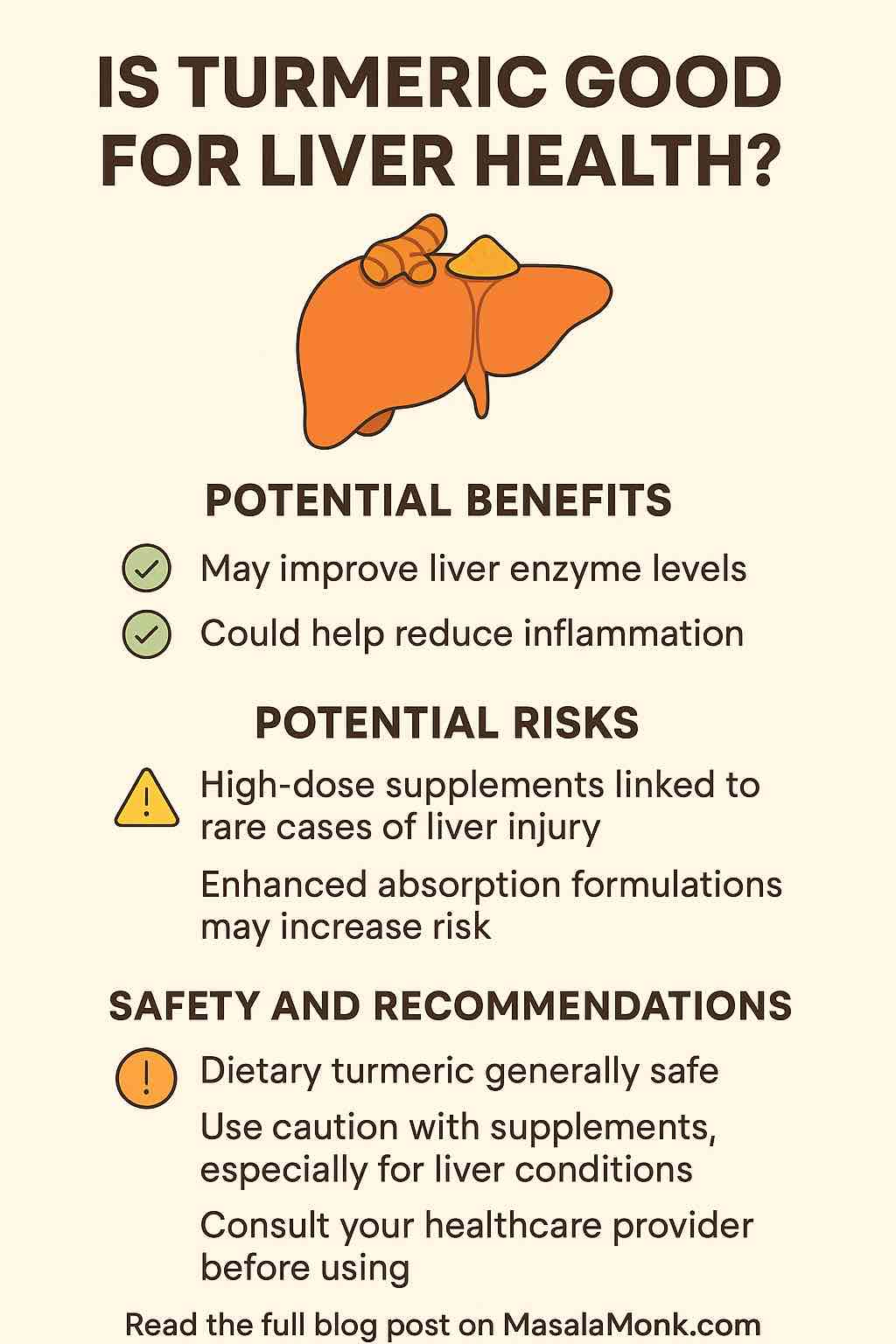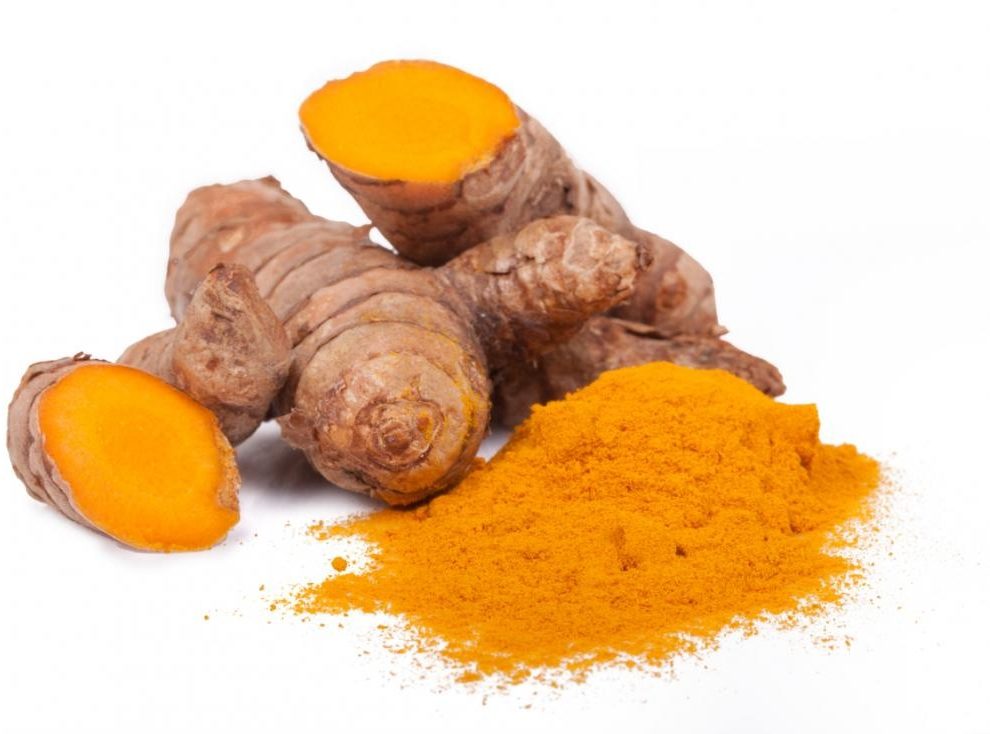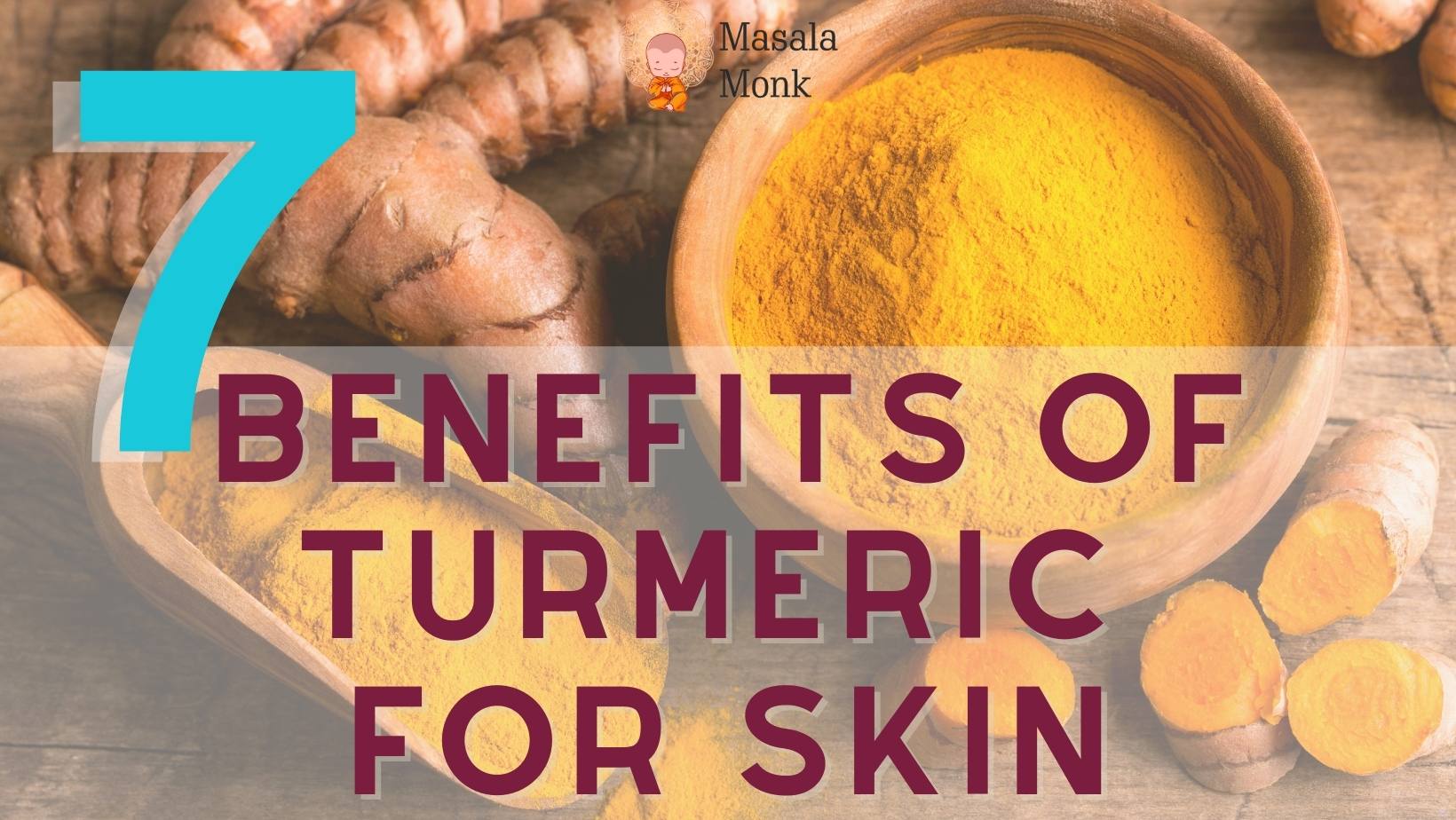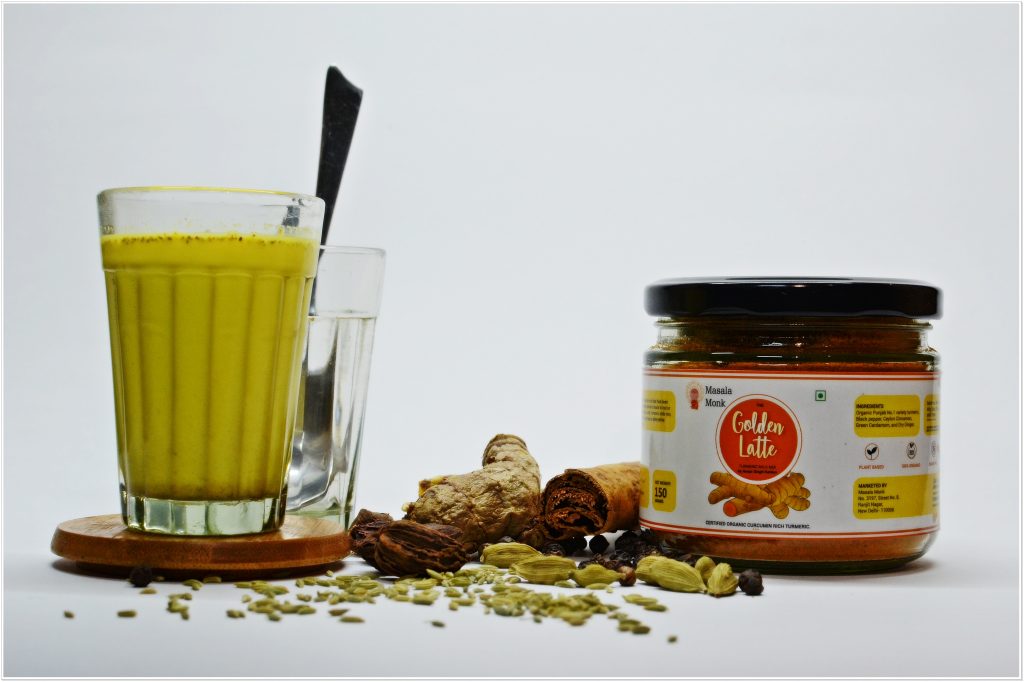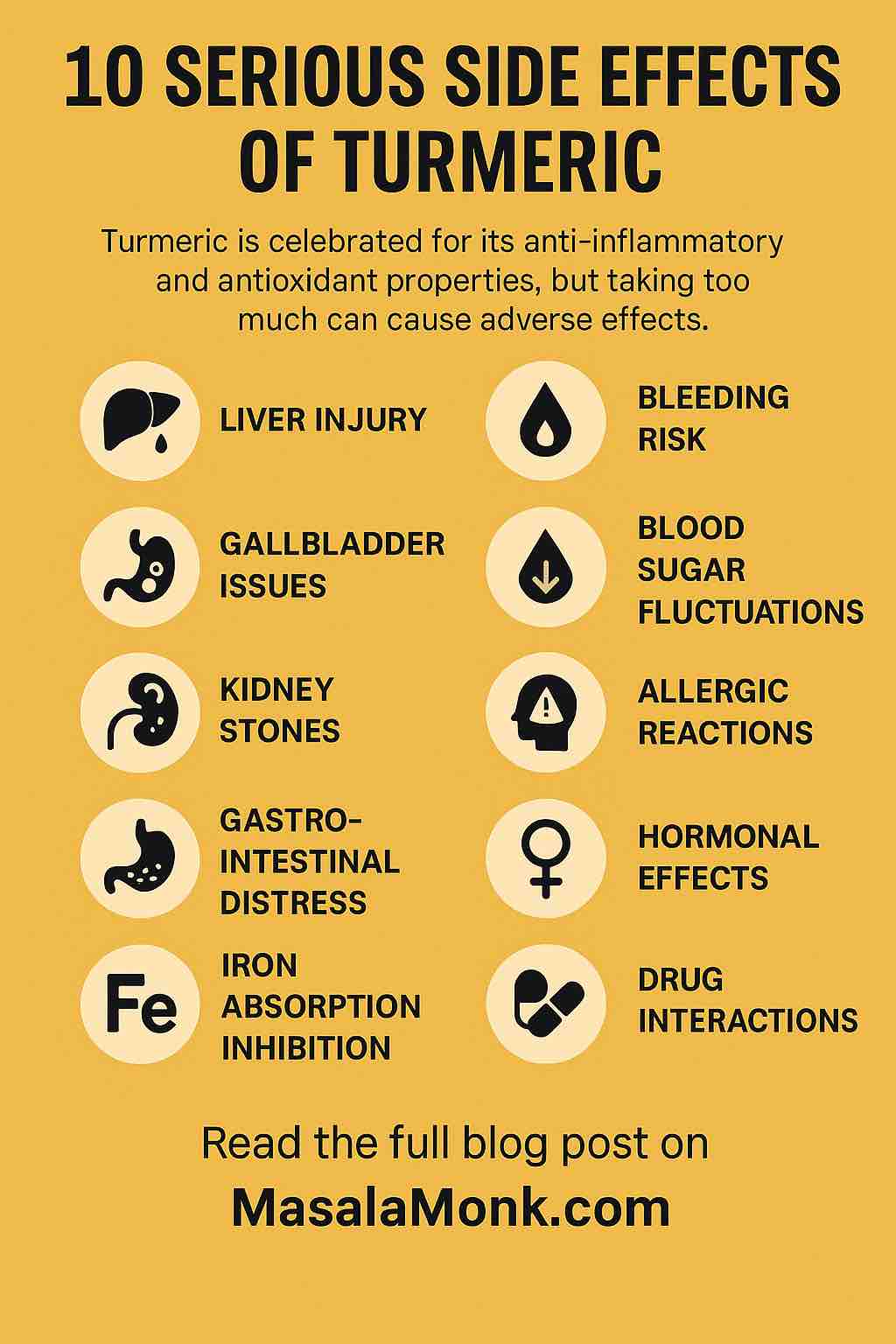
The side effects of turmeric are not something most people think about when they sprinkle the spice on food or sip it in a golden latte. After all, turmeric has built a reputation as one of the world’s healthiest superfoods. From teas and powders to capsules and gummies, this vibrant yellow root is marketed everywhere as a natural remedy for inflammation, joint pain, and even chronic disease. Much of the hype comes from curcumin, the active compound in turmeric that researchers often highlight for its antioxidant and anti-inflammatory powers.
However, while the benefits of turmeric often make headlines, its risks rarely get the same attention. And that’s where balance matters. Just like too much of a “good thing” can backfire, consuming turmeric in excess — especially in concentrated supplements, teas, or powders — can lead to problems. In fact, studies and case reports have linked turmeric overuse to issues ranging from mild digestive distress to more serious health risks such as liver damage, kidney stones, and dangerous drug interactions.
The good news? You don’t need to avoid turmeric entirely. When used in normal food amounts, it can be both safe and beneficial. The key is knowing when turmeric helps and when it harms. By understanding its side effects, you can enjoy turmeric as part of your lifestyle without putting your health at risk.
In this guide, we’ll walk through the 10 most important side effects of turmeric and curcumin. Along the way, you’ll also find practical tips on safe use, so you can make the most of turmeric’s benefits — without falling into the trap of overuse.
10 Serious Side Effects of Turmeric and Curcumin
1. Liver Damage from Turmeric Supplements
Let’s start with the most worrying one: liver damage. While turmeric as a spice in food is safe, things change when it’s concentrated into pills or powders. Several case studies have linked turmeric supplements to hepatotoxicity — liver injury marked by symptoms like jaundice, fatigue, and abnormal blood tests.

In fact, the issue became so concerning that Italy banned health claims on turmeric supplements due to safety fears.
If you’re wondering whether turmeric is truly good or bad for your liver, you might want to read this deep dive: Is Turmeric Good for Your Liver? What the Latest Research Really Says.
👉 If you have liver problems or take medication that already stresses your liver, avoid turmeric supplements and stick to small food-based amounts.
2. Increased Bleeding Risk with Turmeric Use
Here’s another hidden risk: turmeric naturally acts as a blood thinner. While this might sound like a bonus for heart health, it can be dangerous when combined with blood-thinning medications such as aspirin, warfarin, or clopidogrel.

The problem is simple — if your blood doesn’t clot properly, even small cuts can bleed longer, and surgical procedures can become riskier. That’s why doctors typically recommend stopping turmeric supplements at least two weeks before surgery.
3. Gallbladder Pain & Gallstones as Turmeric Side Effects
Turmeric stimulates bile production, which is helpful for digestion. But there’s a catch: for people with gallstones or bile duct blockages, this can trigger painful gallbladder spasms.

So while a little turmeric sprinkled on food is fine, those with gallbladder issues should avoid turmeric supplements unless cleared by their doctor.
4. Kidney Stones Caused by Turmeric Powder
Turmeric is high in oxalates, compounds that bind to calcium and form crystals. Over time, these crystals can grow into kidney stones — especially the common calcium oxalate stones.

To put this in perspective, just one tablespoon of turmeric powder contains up to 60 mg of oxalates. If you’re prone to kidney stones, cutting back on turmeric supplements or powders may save you a lot of pain.
5. Digestive Side Effects of Turmeric (Nausea, Bloating, Diarrhea)
Ironically, while many people take turmeric for digestive health, high doses often cause the opposite effect.
Common complaints include:
- Nausea
- Acid reflux
- Bloating
- Diarrhea

The reason? Concentrated curcumin supplements can irritate the stomach lining. If you notice these symptoms, it may be a sign that you’re taking too much.
If you’d still like to enjoy turmeric in a soothing way, try pairing it with herbs like moringa. Here are some safe, refreshing ideas: 5 Health-Boosting Turmeric and Moringa Tea Recipes.
6. How Turmeric Interferes with Iron Absorption
Another less-discussed problem is how turmeric affects iron absorption. Studies show that turmeric can reduce the body’s ability to absorb non-heme iron (the kind found in plant-based foods).

This might not affect everyone, but for vegetarians, women with heavy periods, or anyone with existing anemia, it could worsen iron deficiency. If iron is already a struggle for you, it’s worth limiting turmeric capsules and powders.
7. Turmeric and Blood Sugar Crashes in Diabetics
Turmeric is often praised for lowering blood sugar, which sounds great — until it drops too low. Combined with diabetic medications, turmeric can lead to hypoglycemia (dangerously low blood sugar).

Symptoms include dizziness, confusion, sweating, and fainting. If you’re diabetic, turmeric might still have a place in your diet, but you’ll need to monitor your levels carefully when adding supplements.
8. Allergic Reactions to Turmeric and Curcumin
Although uncommon, turmeric allergies do happen. Reactions may range from mild rashes and itching to more severe issues like hives or difficulty breathing.

People who are allergic to ginger or yellow food dyes (such as tartrazine) may be more likely to react. If you’re new to turmeric supplements, it’s always safest to start with small doses and watch for reactions.
If you’re exploring turmeric with ginger — another common combo — make sure you understand both the benefits and risks. Here’s a science-backed breakdown: Turmeric and Ginger for Effective Weight Loss.
9. Hormonal Side Effects of Turmeric (Cancer & Estrogen Concerns)
Curcumin behaves like a phytoestrogen, a plant compound that mimics estrogen in the body. For some, this could pose risks — especially those with hormone-sensitive conditions such as breast cancer, ovarian cancer, uterine fibroids, or endometriosis.

The research is mixed: while some studies suggest anticancer effects, others highlight potential hormonal stimulation. Until clearer evidence emerges, it’s best to be cautious if you have hormone-related conditions.
For a balanced perspective, check out 5 Reasons to Eat Turmeric for PCOS, which shows how turmeric can both support and complicate hormonal health depending on the context.
10. Dangerous Turmeric Drug Interactions You Must Know
Finally, turmeric can affect the enzymes in your liver that metabolize medications. This means drugs may either become too weak to work — or too strong, leading to side effects.
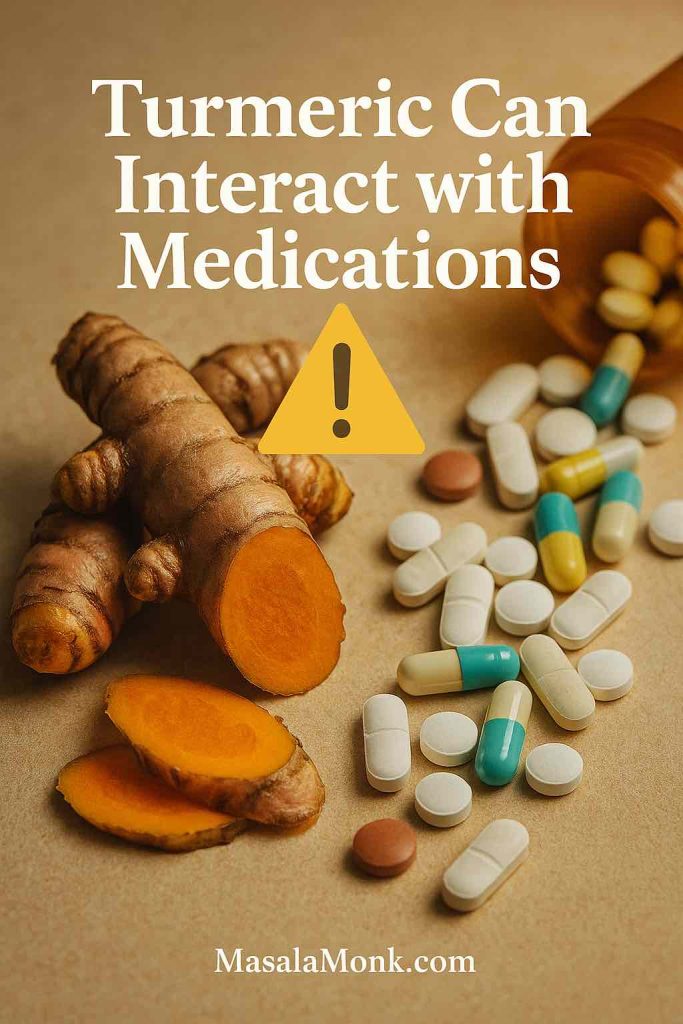
Some of the medications that can interact with turmeric include:
- Antidepressants
- Antibiotics
- Chemotherapy drugs
- Immunosuppressants
The tricky part is that these interactions aren’t always obvious at first. But over time, they can cause serious complications. Always check with your healthcare provider before mixing turmeric supplements with prescription drugs.
If you’re curious about turmeric combined with black pepper — often marketed as “enhanced absorption” — it’s important to know that while it boosts curcumin’s bioavailability, it can also magnify side effects. Here’s a full breakdown: Health Benefits of Turmeric with Black Pepper.
Other Reported Side Effects of Turmeric
Beyond these 10 major risks, there are a few other side effects worth mentioning:
- Headaches and dizziness with very high doses
- Constipation or stomach pain in sensitive individuals
- Skin rashes from applying turmeric topically
- Low blood pressure for those already prone to drops
They may not be as common, but they’re a reminder that moderation is key.
If you prefer drinking turmeric in teas, you can enjoy it safely by sticking to mindful recipes like this Turmeric Ginger Cinnamon Tea.
Side Effects of Turmeric in Different Forms
Not all turmeric is consumed the same way — and each form carries its own risks.
| Form | Common Use | Potential Side Effects |
|---|---|---|
| Turmeric Powder | Cooking, golden milk | Kidney stones, digestive upset |
| Turmeric Tea | Herbal drink | Nausea, acid reflux |
| Turmeric Supplements | Capsules, tablets | Liver damage, drug interactions |
| Topical Turmeric | Face masks, creams | Allergic rashes, skin irritation |
How to Reduce the Side Effects of Turmeric
The goal isn’t to avoid turmeric altogether, but to use it wisely. Here are some simple tips:
- ✅ Stick to culinary amounts in food and drinks
- ✅ Avoid high-dose supplements unless prescribed
- ✅ Stop supplements before surgery or medical procedures
- ✅ Buy from reputable brands to reduce contamination risks
- ✅ Pair turmeric with black pepper and healthy fats for better absorption — but only in safe doses
- ✅ Pay attention to how your body reacts and adjust accordingly
For example, pairing turmeric with black pepper and healthy fats can help absorption — but should be done carefully. To understand why, see this guide: Turmeric & Curcumin Absorption and Bioavailability.
Final Thoughts on Turmeric Side Effects
Turmeric is powerful — and that’s exactly why it must be used with care. In the right amounts, it can support health and well-being. But in excess, or when taken without medical guidance, it can cause more harm than good.
Think of turmeric like medicine: helpful at the right dose, risky if overused. By being aware of its side effects, you can make smarter choices, protect your health, and still enjoy the benefits of this ancient spice.
FAQs on the Side Effects of Turmeric
1. Can you overdose on turmeric?
Yes. Taking very high doses of turmeric — especially in supplements — can cause serious problems such as liver damage, nausea, dizziness, or kidney stones. Symptoms of a turmeric overdose may include stomach pain, yellowing of the skin (jaundice), or unusual fatigue.
2. Is turmeric safe to take every day?
Turmeric is generally safe in food-level amounts, like curries, teas, or turmeric milk. However, daily high-dose supplements increase the risk of side effects of turmeric such as digestive distress, bleeding issues, or drug interactions.
3. What are the side effects of turmeric tea?
Turmeric tea is soothing for many, but in excess it may cause acid reflux, bloating, diarrhea, or nausea. These side effects of turmeric tea are more likely if you drink it on an empty stomach or consume more than 1–2 cups per day.
4. Can turmeric cause headaches or constipation?
Yes. While less common, some people experience headaches, dizziness, or constipation after using turmeric, especially in capsule form. If you notice these side effects of turmeric supplements, it’s best to reduce your intake or stick to food-based turmeric.
5. What are the side effects of turmeric with black pepper?
Turmeric with black pepper (piperine) improves curcumin absorption but also intensifies side effects of turmeric, such as nausea, bleeding risk, and low blood sugar. If you take medications — particularly blood thinners or diabetes drugs — this combination should be avoided unless your doctor approves.
6. Is turmeric milk (haldi doodh) safe?
Yes, turmeric milk is safe in moderation. But drinking too much haldi doodh can cause constipation, stomach upset, or excess calorie intake. These side effects of turmeric in milk are rare when limited to one small cup daily.
If you love haldi doodh, here’s the right way to prepare it without overdoing it: Know the Right Way of Consuming Turmeric Milk.
7. Does turmeric affect the liver?
Yes. Turmeric supplements have been linked to liver toxicity in rare cases. These side effects of turmeric are more common in people with pre-existing liver disease or those who take medications that already stress the liver.
8. Can turmeric lower blood sugar too much?
Yes. Turmeric may amplify the effects of diabetes medications, leading to hypoglycemia (low blood sugar). Symptoms include dizziness, confusion, shaking, or fainting. If you’re diabetic, watch for these side effects of turmeric and monitor your levels closely.
9. What are signs of a turmeric allergy?
Turmeric allergies are uncommon but possible. Look out for rashes, itching, hives, or swelling. Severe allergic reactions to turmeric can cause shortness of breath or anaphylaxis, which require immediate medical help.
10. Who should avoid turmeric supplements?
Turmeric supplements should be avoided by people with gallstones, kidney stones, or liver problems. They are also risky for those on blood thinners, antidepressants, chemotherapy, or diabetes medications, as well as pregnant or breastfeeding women and individuals with hormone-sensitive cancers.
Further Reading & Research on the Side Effects of Turmeric
If you’d like to dive deeper into the science behind the side effects of turmeric and curcumin, here are some trusted resources and studies worth exploring. These go beyond the headlines and offer real-world medical cases, safety alerts, and expert guidance.
- NCBI: LiverTox – Turmeric-Associated Liver Injury
The U.S. National Institutes of Health maintains this resource, which includes case studies of hepatotoxicity (liver damage) caused by turmeric supplements. It’s a must-read if you’re curious about why some countries, like Italy, have restricted health claims on turmeric products.
👉 Read more on NCBI - Australian Therapeutic Goods Administration (TGA): Safety Alert on Turmeric & Curcumin
This government safety warning highlights 18 cases of liver injury, some severe, linked to turmeric and curcumin products — particularly those designed for “enhanced absorption” (often combined with black pepper).
👉 See the full safety alert - The American Journal of Medicine: Case Series on Turmeric-Related Liver Injury
A clinical case report published in 2023 documenting how turmeric supplements led to hospitalization and, in one case, acute liver failure. It reinforces why moderation is so important when it comes to turmeric pills.
👉 Read the case series - PubMed: Anticoagulant Effects of Curcumin
A peer-reviewed study confirming that curcumin has a blood-thinning effect, which validates the risk of increased bleeding when combined with medications like warfarin or aspirin.
👉 Explore the study - Johns Hopkins Medicine: Turmeric Benefits and Risks
A balanced medical guide from one of the most respected hospitals in the U.S. It covers both the health benefits of turmeric and the potential side effects, including drug interactions.
👉 Visit Johns Hopkins Medicine
Why These Resources Matter
When it comes to health, research-backed evidence is essential. While turmeric is safe and beneficial in food-level amounts, these studies and reports show why supplements, teas, and powders in excess can trigger real side effects — from liver injury to bleeding risks.
By exploring the resources above, you’ll see how experts and regulatory bodies around the world are tracking the risks of turmeric, ensuring that consumers stay safe while enjoying its potential benefits.

